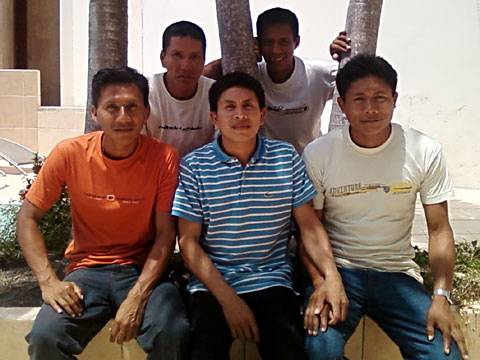he Matsés Movement
(formerly, the Movement in the Amazon for Tribal Subsistence and Economic
Sustainability - M.A.T.S.E.S.) held general
elections in order to choose new leaders for their non-profit association.
The General Assembly of the Matsés Movement is composed of Matsés teachers and there was
unanimous support by the teachers for the newly elected officials. Daniel
Manquid Jiménez Huanán was reelected Director, while Segundo Fasabi Fasabi took
over as Subdirector. In addition, Wilder Flores Gonzales was elected
as the new Secretary, Guillermo Necca Pemen Menque as Treasurer, and Elisban
Nacua Dëmash Bëso as Spokesperson. The Board of Directors is one-hundred
percent indigenous Matsés and will serve as the governing body for the MATSES
organization. In addition, Wilder Flores is the "Subjefe" (Vice Chief) of
the Matsés Native Community.
While some believe that recently contacted indigenous Amazonians like the Matsés people are innocent and should be somehow
isolated and protected from the outside world by the government, the MATSES
organization believes that the Matsés tribe themselves should be allowed to
control and determine their own destiny. If the Matsés people are isolated and
controlled by the government, they will most probably be exploited by that same
government. The Peruvian government’s selling of oil concessions to a foreign
oil company of Matsés titled lands is vivid proof the manner in which they can
be exploited and how governmental control could lead to the destruction of their
indigenous culture.
The Matsés Movement believes that education is the key to survival of the Matsés culture. Only an educated, united Matsés people will be able to defend
themselves from being exploited by foreign invaders such as oil companies and the Peruvian
government. Unfortunately, educating the Matsés people is an expensive task due
to the long distances that are required to travel in order to reach Matsés
villages that are located in the remote frontier of Peru and Brazil. The Matsés
people need to understand the risks to their rainforest and their culture posed
by the exploration, development, and extraction of petroleum by oil workers, and
who better able to inform the Matsés people than the Matsés teachers themselves.
It is important to understand that the Matsés people generally have no access to
cash, obtaining all their needs for survival from the rainforest itself.
Although schools are free for all Matsés children, many can not attend due to a
lack of school supplies. The Matsés Movement has provided hundreds of Matsés
children with notebooks, pencils and other school supplies with their
“Adopt
an Indigenous School” program.
The Director (Daniel Manquid Jimenez) of the
Matsés Movement traveled to
the capital of Lima, Peru in order to meet with representatives of the Rainforest Foundation and AIDESEP
(the national organization of the Indigenous Amazonian people of Peru) in
order to discuss how to best help the Matsés people and prevent the destruction
of their culture by outsiders, in particular oil companies. In addition, they
met with Fred Prins, the former principal representative of the WWF (World Wildlife
Fund) in Peru. WWF Peru is also educating indigenous tribes about the threats to
indigenous cultures posed by oil companies and how indigenous people can prevent
their being exploited by these foreign invaders.
In addition to meeting with indigenous and conservation organizations in Lima, the
MATSES Director and the MATSES Coordinator met with the Lic. Melvy Ormaeche Macassi of the Division of
Statistics of the Peruvian Ministry of Health where they presented seminars on
various MATSES programs and Matsés traditional medicines. The MATSES
organization successfully petitioned the Division of Statistics to perform an
epidemiological study (ASIS - Analysis of Health Situation) of the Matsés people.
The epidemiological study involves gathering basic epidemiological information on ages and life expectancy of the
Matsés population and morbidity and mortality due to various diseases such as
hepatitis and malaria. This basic epidemiological information will be used to
plan future health programs and could open the way for significant international
health aid to finally reach the Matsés people.
Main Page |
The
Matsés People | Mission |
Projects
| Español |
Matsés
|

